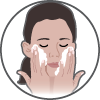Living with Rosacea
CARING FOR YOUR SKIN
 |
Use sunscreen daily with an SPF 30 or higher with broad-spectrum (UVA and UVB) protection. Sunscreen should be labelled: non-oily, fragrance-free, alcohol-free, and meant for sensitive skin.1 |
 |
Avoid sun during peak hours, wear a hat and protective clothing, seek out shade.1 |
 |
Cleanse skin once or twice daily. Use a gentle, no-soap cleanser.3 |
 |
Use fingertips, not an abrasive cloth or sponge.3 Blot or pat, do not rub, face dry.3 |
 |
Apply a moisturizer after you cleanse your skin and have applied your topical medication and allowed it to dry.4 |
ARE THE SYMPTOMS PERMANENT?
- Rosacea is a chronic skin condition that typically presents in middle- and older-aged adults, and is more common in women and people with fair, sensitive skin.7
- There is no cure for rosacea, but it can be treated and controlled.7
- In one small study, 52% of participants reported rosacea that came and went. This group experienced rosacea flare-ups for an average of 13 years. 48% of people who participated in the study had their rosacea clear up after an average of 9 years.8
PSYCHOLOGICAL EFFECT OF ROSACEA
- In addition to the physical effects of acne, this common condition can have psychological effects on you.
- In addition to the physical effects of rosacea, this chronic skin condition can have psychological effects too.
- Rosacea is difficult to deal with because the symptoms present on the face, are very visible, and cannot be covered up with clothing.9
- Individuals diagnosed with rosacea can suffer from anxiety, frustration, embarrassment, and depression.10,11
- Rosacea flares can be managed and controlled, so if affects how you interact with people home or at work, or causes you to be embarrassed about your appearance, consider seeking treatment. Symptoms can be more easily managed the earlier they are caught.

